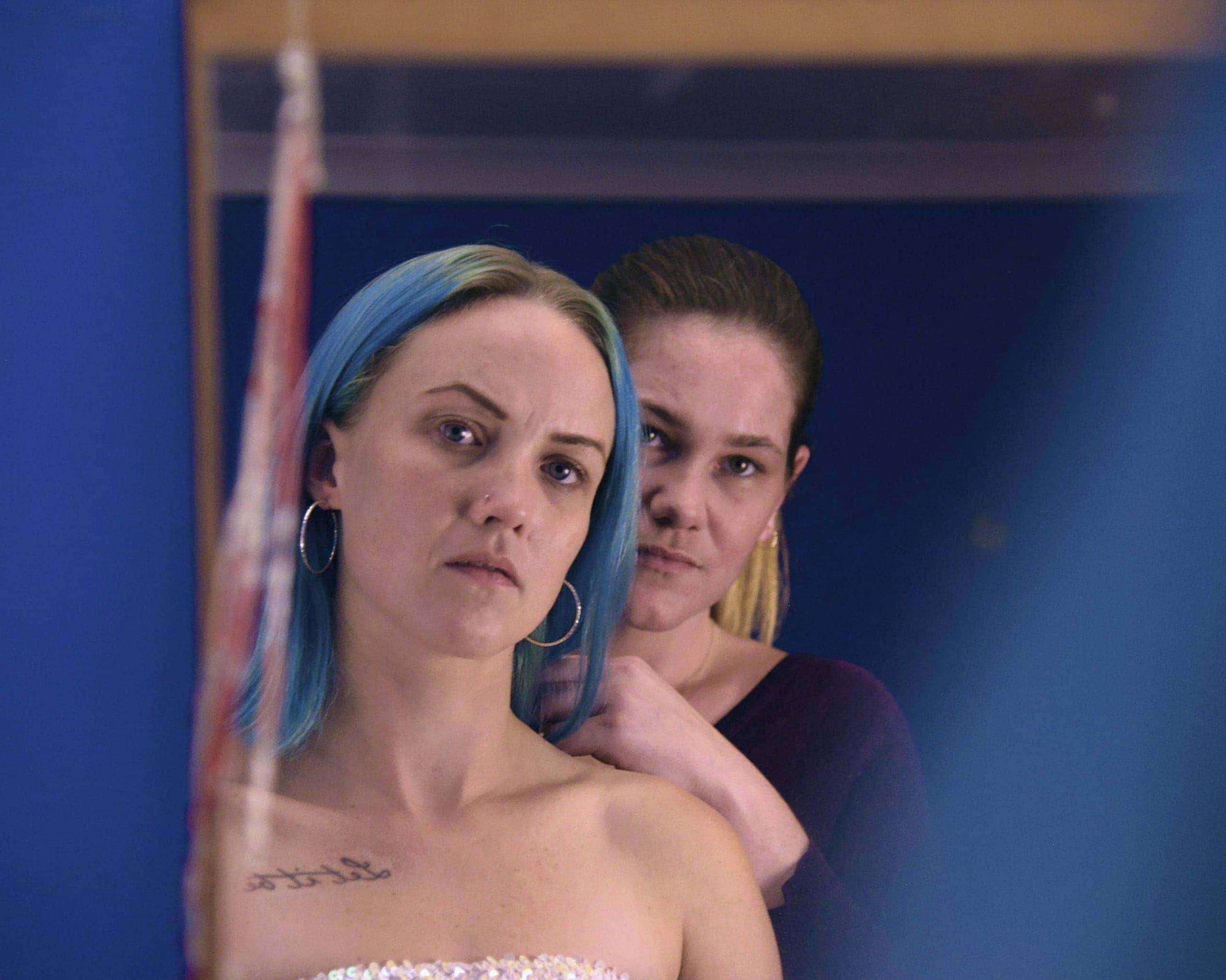

Lynn + Lucy is the debut feature from Fyzal Boulifa, who was Bafta-nominated for his short film The Curse. A tale of friendship tested by tragedy, fear and resentment from the local community, Lynn + Lucy is a taut and intimate melodrama which haunts you long after its credits roll. With a slice-of-life aesthetic, the film is carried by stirring and vivid lead performances by Nichola Burley and street-cast Roxanne Scrimshaw.
Lynn + Lucy. That plus sign is exactly right – you can imagine the title tagged on a bathroom stall in gel pen.
Lynn + Lucy – you can imagine the title tagged on a bathroom stall in gel pen
Since age eleven, Lynn (Roxanne Scrimshaw) and Lucy (Nichola Burley) have been so close that rumours circulated at school that they were ‘together’. Now approaching thirty, they show off their matching tattoos – two hearts interlocked on the back of the right shoulder – in a local nightclub and dance to ‘their’ song: Paris Hilton’s ‘Stars are Blind’.
Living across the street from one another, in a colourless housing estate in Harlow, Essex, Lynn and Lucy truly live parallel lives – well, almost. At sixteen, Lynn got pregnant and became a ‘stay-at-home mum’, as she puts it. ‘While I was up to my elbows in nappies,’ she says, ‘Lucy was being scraped off the club floors.’
ArrayLucy, pretty and bolshie with a shock of blue hair, is the live wire of the duo. She wears a silver Puffa jacket for a quicksilver disposition, eyes darting about the place. Beige-cardiganed Lynn has moved on from teenage antics, become more grounded – stoically weathering put-downs from her embittered husband, paralysed by a world which seems to promise her very little indeed.
For Lynn, a school leaver’s role sweeping up hair at a hairdresser is something of a breakthrough. Another chink of light comes in the baptism of Lucy’s son: here, Lynn plays the unreasonably proud new godmother. She sees the arrival of baby Harrison as a sign that Lucy will settle down and their lives will once again converge.
The kind of cinema that hands us to ourselves, illuminates our society with a drab kind of light, as if creeping through net curtains
Lucy, though, is suffering from post-natal depression and coming to terms with the concrete reality of motherhood, stuck at home with another equally toxic partner. And when baby Harrison is rushed to hospital, gossip festers in the salon. Time to test Lynn’s loyalty to her best friend.
The scene is set for some grim social realism – that most typically British of film genres. It’s the kind of cinema that hands us to ourselves, illuminates our society with a drab kind of light, as if creeping through net curtains. Debut feature director Fyzal Boulifa transcends the kitchen sink to tell a much older story: Lynn + Lucy is no less than a morality play.


Despite the sugary shots, video games and hoop earrings – and despite the raw, no-frills aesthetic of social realism, inequality running across faces like fine lines – this is a role call that has existed across human societies for thousands of years. This is conformity vs. ostracism – welcome to the witch-hunt.
Sociologically speaking, witchcraft accusations act as punishment for stepping outside social norms; those accused of being a witch (historically women) are left with no choice but to own the label as a way to recover at least a semblance of power against the inevitable persecution to follow.
Despite the sugary shots, video games and hoop earrings this is a role call that has existed across human societies for thousands of years
While witches have rather slipped out of fashion, the same mass hysteria is applied to no end of contemporary equivalents – and there’s nothing more destabilising to a patriarchal world order than a Bad Mum. Lucy, well-aware she doesn’t fit the prescribed mould of selfless nurturer, lines up to be tarred and feathered. Witch. Defiant. Witch. Unhinged. Witch. What happened to Harrison?
A psychological portrait, street-cast Roxanne Scrimshaw’s downcast gaze and hunched posture carry the film. The camera rarely leaves her face, and that’s a tense pleasure – after all, we’re searching it for any hint: will Lynn’s loyalties shift? What could you be made to believe about someone you’ve loved for half your life? And what might be appealing, rather than frightening, about turning your back on the girl you always wanted to be?
Lynn + Lucy is available to watch now on BFI Player (https://player.bfi.org.uk/ or through Amazon Prime and Apple TV).



